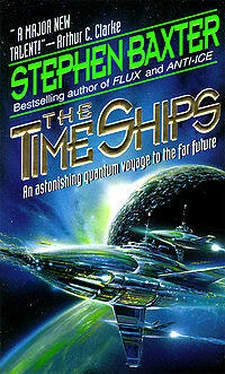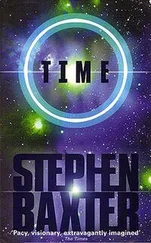“I’m surprised you’ve not been listening to the phonograph,” I said to Moses. “Are you not interested in the details of this world we find ourselves in?”
Moses replied, “But much of its output is either music or fiction — and that of the Moralizing, Uplifting sort which I have never found palatable — as you know! — and I have become quite overwhelmed with the stream of trivia which masquerades as news. One wants to deal with the great Issues of the Day — Where are we? How did we get here? Where are we headed? — and instead one is inundated with a lot of nonsense about train delays and rationing shortfalls and the obscure details of remote military campaigns, whose general background one is expected to know already.”
I patted his arm. “What do you expect? Look here: we’re dipping into History, like temporal tourists. People are generally obsessed by the surface of things — and rightly so! How often in your own Year do you find the daily newspapers filled with deep analyses of the Causes of History? How much of your own conversation is occupied with explanations as to the general pattern of life in 1873?…”
“Your point is taken,” he said. He showed little interest in the conversation; he seemed unwilling to engage much concentration in the world around him. Instead: “Look,” he said, “I must tell you something of what your Morlock friend has related of this new theory.” His eyes were brighter, his voice clear, and I saw that this was an altogether more palatable subject for him — it was an escape, I supposed, from the complexities of our predicament into the clean mysteries of science.
I resolved to humor him; there would be time enough for him to confront his situation in the days to come. “I take it this has some bearing on our current plight—”
“Indeed it does,” said Nebogipfel. He ran his stubby fingers over his temples, in a gesture of evident, and very human, weariness. “Quantum Mechanics is the framework within which I must construct my understanding of the Multiplicity of Histories which we are experiencing.”
“It’s a remarkable theoretical development,” Moses enthused. “Quite unforeseen in my day — even unimaginable! — it’s astonishing that the order of things can be overturned with such speed.”
I put down Nebogipfel’s bit of paper. “Tell me,” I said.
[5]
The Many Worlds Interpretation
Nebogipfel made to speak, but Moses held up his hand. “No — let me; I want to see if I’ve got it straightened out. Look here: You imagine the world is made up, pretty much, of atoms, don’t you? You don’t know the composition of these things, for they are far too fine to see, but that’s pretty much all there is to it: a lot of little hard Particles bouncing around like billiard balls.”
I frowned at this over-simplification. “I think you should remember who you’re talking to.”
“Oh — let me do this my own way, man! Follow me closely, now: for I have to tell you that this view of things is wrong, in every particular.”
I frowned. “How so?”
“To begin with, you can put aside your Particle — for there is no such animal. It turns out that — despite the confidence of Newton — one can never tell, precisely, where a Particle is, or where it is heading.”
“But if one had microscopes fine enough, surely, to inspect a Particle, any degree of accuracy one desired—”
“Put it aside!” he commanded. “There is a fundamental limitation on measurement — called the Uncertainty Principle, I gather — which places a sort of bottom level to such exercises.
“We have to forget about any definiteness about the world, you see. We must think in terns of Probability — the chance of finding a physical object at such-and-such a place, with a speed of so-and-so — et cetera. There’s a sort of fuzziness about things, which—”
I said bluntly, “But look here — let’s suppose I perform some simple experiment. I will measure, at some instant, the position of a Particle — with a microscope, of an accuracy I can name. You’ll not deny the plausibility of such an experiment, I hope. Well, then: I have my measurement! Where’s the uncertainty in that?”
“But the point is,” Nebogipfel put in, “there is a finite chance that if you were able to go back and repeat the experiment, you would find the Particle in some other place — perhaps far removed from the first location…”
The two of them kept up the argument in this vein for some time.
“Enough,” I said. “I concede the point, for the sake of the discussion. But what is the relevance for us?”
“There is — will be — a new philosophy called the Many Worlds Interpretation of Quantum Mechanics, “Nebogipfel said, and the sound of his queer, liquid voice, delivering such a striking phrase, sent shivers along my spine. “There is another ten or twenty years to elapse before the crucial papers are published — I remember the name of Everett…”
“It’s like this,” Moses said. “Suppose you have a Particle which can be in just two places — here or there, we will say — with some chance associated with each place. All right? Now you take a look with your microscope, and find it here…”
“According to the Many Worlds idea,” Nebogipfel said, “ History splits into two when you perform such an experiment. In the other History, there is another you — who has just found the object there, rather than here.”
“Another History?”
Moses said, “With all the reality and consistency of this one.”
He grinned. “There is another you there is an infinite number of ’you’s’ — propagating like rabbits at every moment!”
“What an appalling thought,” I said. “I thought two were more than enough. But look, Nebogipfel, couldn’t we tell if we were being split up in this way?”
“No,” he said, “because any such measurement, in either History, would have to come after the split. It would be impossible to measure the consequences of the split itself.”
“Would it be possible to detect if these other Histories were there? — or for me to travel there, to meet another of this sheaf of twin selves you say I have?”
“No,” Nebogipfel said. “Quite impossible. Unless—”
“Yes?”
“Unless some of the tenets of Quantum Mechanics prove to be false.”
Moses said, “You can see why these ideas could help us make sense of the paradoxes we have uncovered. If more than one History can indeed exist—”
“Then causality violations are easily dealt with,” Nebogipfel said. “Look: suppose you had returned through time with a gun, and shot Moses summarily.” Moses paled a little at this. Nebogipfel went on: “So there we have a classic Causality Paradox in its simplest terms. If Moses is dead, he will not go on to build the Time Machine, and become you — and so he cannot travel back in time to do the murder. But if the murder does not take place, Moses lives on to build the machine, travels back — and kills his younger self. And then he cannot build the machine, and the murder cannot be committed, and—”
“Enough,” I said. “I think we understand.”
“It is a pathological failure of causality,” Nebogipfel said, “a loop without termination.
“But if the Many Worlds idea is right, there is no paradox. History splits in two: in one edition, Moses lives; in the second, he dies. You, as a Time Traveler, have simply crossed from one History into the other.”
“I see it,” I said in wonder. “And surely this Many Worlds phenomenon is precisely what we have witnessed, Nebogipfel and I — we have already watched the unfolding of more than one edition of History…” I felt enormously reassured by all this — for the first time, I saw that there might be a glimmer of logic about the blizzard of conflicting Histories which had hailed about my head since my second launch into time! Finding some sort of theoretical structure to explain things was as important to me as finding solid ground beneath his feet might be to a drowning man; though what practical application we might make of all this I could not yet imagine.
Читать дальше
Конец ознакомительного отрывка
Купить книгу









